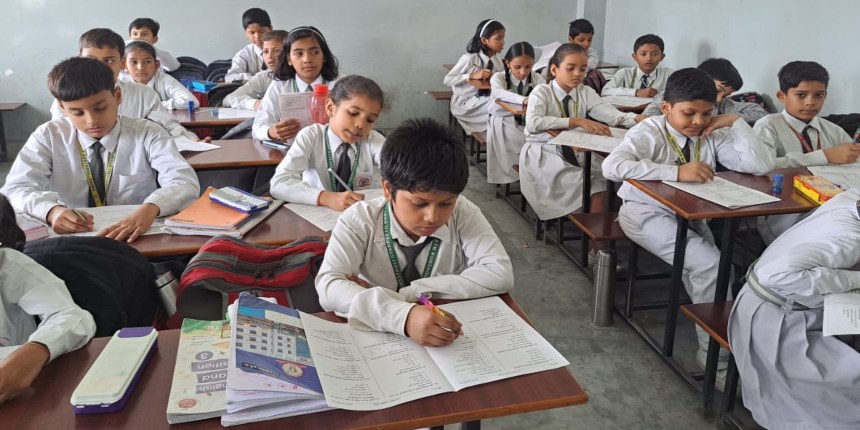NCERT’s new exam body, PARAKH, plans AI-based learning, digitised assessments, international consultancy
Atul Krishna | December 16, 2023 | 10:12 AM IST | 3 mins read
A unit of NCERT, PARAKH will set up AI-based programmes, digitise assessments and design new report cards by 2026 and 2028.
CBSE 12 Class Free Mock Test
Boost your exam preparation with our CBSE 12 Class Free Mock Test, designed as per the latest exam pattern.
Attempt Now
NEW DELHI: The National Council of Educational Research and Training’s (NCERT) new constituent body for exams and assessments, PARAKH, is planning to develop AI-based personalised adaptive learning programmes (PALs) in schools by 2028. It also plans to be a full-fledged centre by then and provide consultancy and technical expertise to “other countries in the region”.
The Performance Assessment, Review and Analysis of Knowledge for Holistic Development (PARAKH full form) was set up as an autonomous unit within the NCERT in February 2023. A key recommendation on exam reforms of the National Education Policy (NEP) 2020, its primary objective is to bring parity between India’s five dozen school examination boards – including the Central Board of Secondary Education (CBSE) – and set norms and standards for assessment and evaluation at the school level. As reported in the first part of this series, it aims to achieve this objective – of steering the processes that bring “equivalence” among school boards – by 2026.
CBSE Class 12th 2026 QP's: Physical Education | Physics
CBSE Class 12th 2026 Answer Key: Physics
CBSE Class 12: Free Mock Test | Formula Sheet: Maths | Physics | Chemistry
CBSE Class 12 (All Subjects): PYQ's | Question Bank | Practice Questions | Sample Papers
But PARAKH-NCERT clearly has loftier goals than just this and has created roadmaps detailing what it hopes to achieve in the first year, within three years (by 2026) and within five years, (by 2028).
Also in February 2023, NCERT roped in ETS as a technical partner for PARAKH. A global private testing body, ETS is best known for conducting the TOEFL exam to test for English proficiency and the GRE for students hoping to study abroad.
The PARAKH roadmap
According to the PARAKH Roadmap, accessed by Careers360 through an application filed under the Right to Information (RTI) Act, the body has plans to develop AI-based Personalised Adaptive Learning programmes or PALs to “enhance attainment of learning standards” of students. PALs are expected to be ready by 2028.
Along with the development of PALs, it will advise the NCERT on holding the next National Achievement Survey (NAS 2027). By 2026, it will also digitise assessments in a way that tracking achievements at the school and student levels is possible.
Also Read| Board Exam 2024 Live: Classes 10, 12 dates sheets, policies
PARAKH plans to establish itself as an “independent centre” by 2026 and by 2028, provide “consultancy and technical expertise” on assessment to “other countries in the region”.
For its first year, PARAKH has three priorities:
Supporting NCERT with establishing equivalence across educational boards and board exams.
Increase technical quality of NAS and other large-scale assessments
Advance the use of effective and equitable school-based assessments.
Assessment for teachers, systems
The PARAKH-NCERT body will have a role in setting general standards for teaching and education systems. PARAKH will “support and supervise” the State School Standards Authority (SSSA) on teacher and system assessment and accreditations.
Yet to be established, SSSAs are meant to be independent state bodies that will create a minimum set of standards across each state. According to the NEP 2020, the State Councils of Educational Research and Training (SCERT) are in charge of creating these parameters “in consultation with various stakeholders”.
Preparation for NAS 2024
PARAKH will also be working on conducting the National Achievement Survey (NAS) 2024 and Foundational Learning Study (FLS) 2024 – both country-wide surveys aimed at testing students’ learning competencies across school boards.
For NAS 2024, PARAKH has begun preparing questionnaires from December and is expected to complete the exercise by February 2024. A pilot test of the NAS 2024 questionnaires in different languages and across states is scheduled for February 2024.
According to the documents, NAS 2024 will be similar to NAS 2021 so that the scores can be compared. PARAKH has already conducted the State Educational Achievement Survey (SEAS) on November 3.
PARAKH will also create templates for Holistic Progress Cards (HPCs) across educational levels and develop learning standards at foundational, preparatory, middle and secondary levels. HPCs, as defined in the NEP 2020, are a “multidimensional report that reflects in great detail the progress as well as the uniqueness of each learner in the cognitive, affective, and psychomotor domains”.
PARAKH is funded by the World Bank under the Strengthening Teaching-Learning and Results for States (STARS) project.
Read Part 3| PARAKH NCERT: Private, US-based testing agency, ETS, will play major role in exam reforms in India
This is the second of a three-part series on PARAKH, the new body set up by NCERT to guide India’s school examination systems.
Follow us for the latest education news on colleges and universities, admission, courses, exams, research, education policies, study abroad and more..
To get in touch, write to us at news@careers360.com.